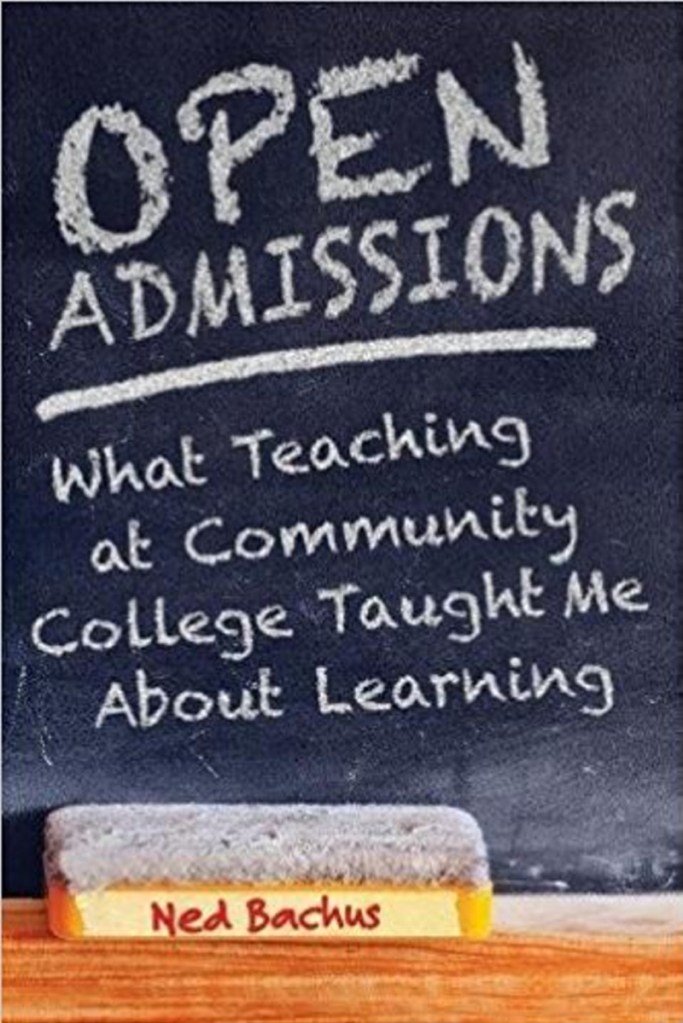For many, the first day of school is the beginning of a new journey. Excitement and uncertainty are likely mixed in with fear of the unknown.
First-generation college students, especially, may feel as though they are in a foreign country as they try to navigate the academic, social and administrative aspects of college. For many, the situation is all the more challenging because, in addition to being new college students, they are new to America.
Ned Bachus explores these journeys and others in his well-written, engaging and deeply personal book “Open Admissions: What Teaching at Community College Taught Me About Learning.” Bachus reflects on his nearly 40-year teaching career, most of which was at Community College of Philadelphia, and considers the challenges his students faced in just getting to the point where they could enroll in college, let alone graduate. They encountered language barriers, financial pressures, challenging family and health conditions; in some cases, students were attempting to get their lives back on track after incarceration or struggles with substance abuse.
For non-traditional students, college is “an epic foray through unknown parts in the hope of reaching a better but somewhat vaguely understood destination,” Bachus writes. Most of his students “had to shoehorn their studies into an already jam-packed life,” and Bachus never ended a semester “without at least one or two students talking to me about their impending or actual homelessness” or other tumult such as fires, eviction, abandonment, violence or illness.
Many students persevered, but sometimes there came a tipping point where so many things went wrong that a student’s chances of success were irreparably damaged.
In contrast, Bachus discusses the experiences of traditional students who enroll in colleges “with their feet already pointed toward independence and success.” Many traditional college students have college-graduate parents, and for those students, college is a natural next step after high school, and much less disorienting. For traditional students, colleges can be amenity-rich cocoons, “insulated and somewhat protective,” Bachus writes, with comfortable accommodations, locally sourced food and state-of-the-art fitness facilities.
Bachus adds depth to comments about his students’ community college experiences by comparing them with his sabbatical in Cill Rialaig, a cliff-bound artists’ retreat in a remote coastal area of southwest Ireland. While there, he experienced physical, social and, to a certain extent, linguistic isolation – and was well out of his longtime comfort zone in Philadelphia.

Ned Bachus Photo by Kathleen Bachus
Alternating chapters between his final semester teaching and his own experience in Ireland, Bachus came to see his students’ experience through a new lens. He became aware of their challenges in ways he had not previously imagined. Upon arriving in Ireland, Bachus felt disoriented, isolated and unsure of what he should be doing. “Like the screeching gulls outside, and like community college freshmen, I’d landed in the middle of things.”
His disorientation is well-founded. An Irish Times article on Cill Rialaig notes that it is almost “impossible to find,” even with the help of Google maps.
Moving beyond his comfort zone helped Bachus “recognize connections” among topics and ideas he knew little about – the very outcome he strove for with his students. Even on his last day in Ireland, he writes that he felt like a “stumbling school kid.”
Bachus is a musician as well as a teacher, and throughout “Open Admissions” he uses the narrative melody of his teaching career to make improvisational forays into other journeys.
While the primary story line in this book is the counterpoint between teaching at community college and his experience in Ireland, in a larger sense “Open Admissions” is a mosaic about journeys.
In addition to his students’ experiences as non-traditional college students and his own experiences in Ireland, Bachus writes about his personal health-care journeys to treat cardiac issues and his decision to retire from teaching and to move from Philadelphia to Maine, where he now lives.
While preparing for his move to Maine, Bachus came across items that had belonged to his deceased mother. These discoveries led to the most tenderly told journey in “Open Admissions,” in which he describes the travels he undertook as a boy with his single-parent, English-as-a-second language mother in search of economic security and a better life. That life experience enables him to write about his students’ struggles with authenticity and to navigate successfully the apparent disconnect between his commenting on the challenges faced by first-generation community college students while on sabbatical in Europe at an artists’ retreat.
Bachus’s wife, Kathleen, is an important figure in this book. She played a role that was “central … in every journey,” Bachus wrote, and was his partner at critical junctures as they “grappled with the unquantifiable elements” in navigating life. His love and esteem for Kathleen are apparent throughout the book.
Bachus closes “Open Admissions” by describing the important role played by the more than 1,100 community colleges in the United States, where “success and redemption stories play out one student at a time.” All too often, a college’s prestige is based on how many students it denies admission. Ned Bachus reminds us of the importance of colleges that focus on admitting and supporting students – and giving them the opportunity for transformation and success.
Dave Canarie is an attorney and adjunct faculty member at the University of Southern Maine.
Send questions/comments to the editors.



Success. Please wait for the page to reload. If the page does not reload within 5 seconds, please refresh the page.
Enter your email and password to access comments.
Hi, to comment on stories you must . This profile is in addition to your subscription and website login.
Already have a commenting profile? .
Invalid username/password.
Please check your email to confirm and complete your registration.
Only subscribers are eligible to post comments. Please subscribe or login first for digital access. Here’s why.
Use the form below to reset your password. When you've submitted your account email, we will send an email with a reset code.